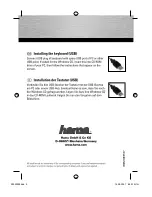
Program mode: HD-1
54
Pitch Slope, pitch, and note
Ribbon
[–12…+12]
You can use the ribbon controller for pitch-bend. This
parameter sets the range of the ribbon’s pitch-bend, in
semitones.
Positive (+)
values make the pitch rise when you press
the ribbon controller to the right of center, and
negative (–)
values will cause the pitch to fall.
For example, with a setting of
+12
, pressing the far
right edge of the ribbon controller will raise the pitch
one octave, and pressing the far left edge will lower the
pitch by one octave.
With a setting of
–12
, the effect is reversed; pressing on
the right edge will
lower
the pitch, and pressing on the
left will
raise
the pitch.
When you lift off of the ribbon, the pitch will snap back
to the center (unless you’re using the SW1/2 “Ribbon
Lock” feature). So, by tapping on the right edge of the
ribbon and then releasing quickly, you can create
guitar “hammer-on” effects.
JS (+X)
[–60…+12]
This sets the maximum amount of pitch bend, in
semitones, when you move the joystick to the right.
For normal pitch bend, set this to a positive value.
For example, if you set this to
+12
and move the
joystick all the way to the right, the pitch will rise one
octave above the original pitch.
JS (–X)
[–60…+12]
This sets the maximum amount of pitch bend, in
semitones, when you move the joystick to the left. For
normal pitch bend, set this to a negative value.
For example, if you set this to
–60
and move the
joystick all the way to the left, the pitch will fall five
octaves below the original pitch. You can use this to
create guitar-style downward swoops.
AMS (Pitch)
[List of AMS Sources]
This selects a modulation source to control the pitch.
For a list of AMS sources, see “AMS (Alternate
Modulation Source) List” on page 967.
Intensity
[–12.00…+12.00]
This controls the depth and direction of the pitch
modulation, in semitones.
For example if you set
AMS
to
After Touch
and then
press down on the keyboard, the pitch will rise if this
parameter is set to a
positive (+)
value, or fall if this
parameter is set to a
negative (–)
value.
2–2b: Pitch EG
Intensity
[–12.00…+12.00]
This controls the initial effect of the Pitch EG on
Oscillators 1’s frequency, in half-steps, before any AMS
modulation.
The Pitch EG’s shape can swing all the way from +99 to
–99. When the Intensity is set to a
positive (+)
value,
positive values from the EG raise the pitch, and
negative values lower the pitch.
When the Intensity is set to a
negative (–)
value, the
effect of the EG is reversed; positive EG values mean
lower
pitches, and negative EG values mean
higher
pitches.
AMS (Pitch EG)
[List of AMS Sources]
This selects any AMS modulation source to scale the
amount of the Pitch EG applied to the pitch.
For a list of AMS sources, see “AMS (Alternate
Modulation Source) List” on page 967.
Intensity
[–12.00…+12.00]
This controls the depth and direction of the pitch EG
AMS modulation. The AMS modulation and the initial
Intensity are added together to determine the Pitch
EG’s final effect.
With
positive (+) values
, greater modulation will
increase the effect of the Pitch EG, as shown in example
B
below.
With
negative (–) values
, greater modulation will
introduce the
opposite
effect of the Pitch EG–like
inverting the polarity of the envelope. You can use this
in several different ways:
• You can set an initial positive amount with the
Intensity parameter, and then reduce this amount
with AMS. In this case, the final effect of the EG is
simply diminished, and not actually inverted, as
shown in example
C
.
• You can also set the AMS Intensity amount to be
greater than the initial Intensity. In this case, the EG
will have a positive effect with low modulation
amounts, and an inverted effect at higher
modulation amounts–as shown in example
D
.
Pitch EG AMS
2–2c: LFO1/2
LFO1 and LFO2 can both modulate the pitch. You can
control the strength of each LFO’s modulation in three
different ways:
Pitch
Note on keyboard
2oct
1oct
1oct
C4 C5
+2
+1
0
–1
Change
to Pitch
Change
to Pitch
A. Original EG
B. Intensity = +12.00
C. Intensity = –3.00
D. Intensity = –12.00
Summary of Contents for Electronic Keyboard
Page 1: ...Parameter Guide Parameter Guide ...
Page 2: ......
Page 180: ...Program mode EXi 170 ...
Page 290: ...EXi STR 1 Plucked String 280 ...
Page 572: ...Sequencer mode 562 ...
Page 700: ...Global mode 690 ...
Page 751: ...Insert Effects IFX1 IFX12 Routing 741 Fig 2 3a Fig 2 3b ...
Page 902: ...Effect Guide 892 ...
















































